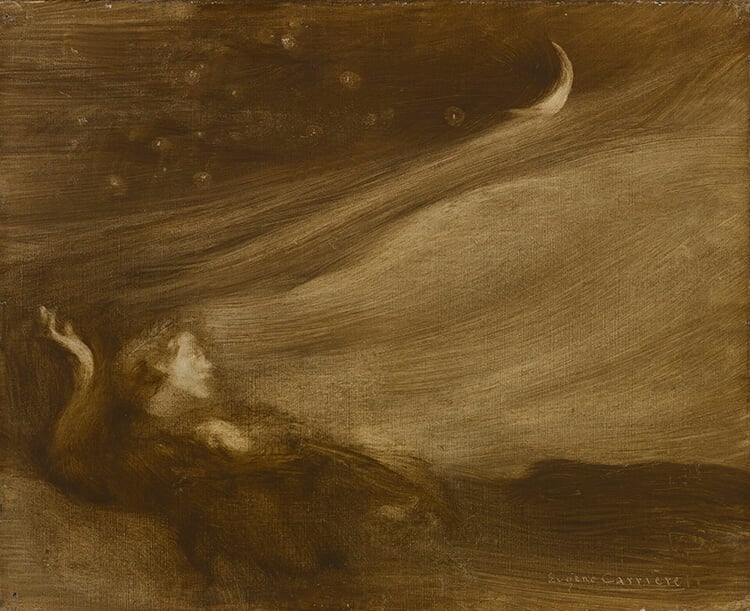Additional information
| Weight | 1 oz |
|---|
$28.00
Eugène Carrière
A soft, warm, meditative blend of balsam tolu, tonka absolute, vetiver, bourbon vanilla, palo santo, sandalwood, and Indonesian teak.
Out of stock
| Weight | 1 oz |
|---|
You must be logged in to post a review.
There were a prince and a princess sitting by a stream in a wooded valley. Their seven servants had set up a scarlet canopy beneath a tree, and the royal young couple ate a box lunch to the accompaniment of lutes and theorbos. They hardly spoke a word to one another until they had finished the meal, and then the princess sighed and said, “Well, I suppose I’d best get the silly business over with.” The prince began to read a magazine.
“You might at least –” said the princess, but the prince kept on reading. The princess made a sign to two of the servants, who began to play an older music on their lutes. Then she took a few steps on the grass, held up a bridle bright as butter, and called, “Here, unicorn, here! Here, my pretty, here to me! Comecomecomecomecome!”
The prince snickered. “It’s not your chickens you’re calling, you know,” he remarked without looking up. “Why don’t you sing something, instead of clucking like that?”
“Well, I’m doing the best I can,” the princess cried. “I’ve never called one of these things before.” But after a little silence, she began to sing.
I am a king’s daughter,
And if I cared to care,
The moon that has no mistress
Would flutter in my hair.
No one dares to cherish
What I choose to crave.
Never have I hungered,
That I did not have.
I am a king’s daughter,
And I grow old within
The prison of my person,
The shackles of my skin.
And I would run away
And beg from door to door,
Just to see your shadow
Once, and never more.
So she sang, and sang again, and then she called, “Nice unicorn, pretty, pretty, pretty,” for a little longer, and then she said angrily, “Well, I’ve done as much as I’ll do. I’m going home.”
The prince yawned and folded his magazine. “You satisfied custom well enough,” he told her, “and no one expected more than that. It was just a formality. Now we can be married.”
“Yes,” the princess said, “now we can be married.” The servants began to pack everything away again, while the two with the lutes played joyous wedding music. The princess’s voice was a little sad and defiant as she said, “If there really were such things as unicorns, one would have come to me. I called as sweetly as anyone could, and I had the golden bridle. And of course I am pure and untouched.”
“For all of me, you are,” the prince answered indifferently. “As I say, you satisfy custom. You don’t satisfy my father, but then neither do I. That would take a unicorn.” He was tall, and his face was as soft and pleasant as a marshmallow.
When they and their retinue were gone, the unicorn came out of the wood, followed by Molly and the magician, and took up her journey again. A long time later, wandering in another country where there were no streams and nothing green, Molly asked her why she had not gone to the princess’s song. Schmendrick drew near to listen to the answer, though he stayed on his side of the unicorn. He never walked on Molly’s side.
The unicorn said, “That king’s daughter would never have run away to see my shadow. If I had shown myself, and she had known me, she would have been more frightened than if she had seen a dragon, for no one makes promises to a dragon. I remember that once it never mattered to me whether or not princesses meant what they sang. I went to them all and laid my head in their laps, and a few of them rode on my back, though most were afraid. But I have no time for them now, princesses or kitchenmaids. I have no time.”
A matter of formality: lilac musk, sandalwood, sweet pea, watermelon accord, pale woods, elemi, and oakmoss.
Tinkling tiny feet scuttle across a massive oak desk, navigating through a flurry of papers and a maze of discarded books, wires, and bolts. Glistening green venom beads at its chelicerae, and a ruby hourglass flashes from the creature’s underbelly as it begins to weave.
Pinot noir, dark myrrh, red sandalwood, black patchouli, night-blooming jasmine, and attar of rose.
The Basque God of Night and all the perils of the darkness. Though he is the God of the Danger that Lurks in the Gloom, he is kind to men and warns them against the nighttime hazards and sets rules of conduct for both the living and the dead as they travel through his domain. It is said that since the warm, vibrant daylight is for the living, the abodes of night are reserved for the dead. All who heed his counsel are protected, but woe be to any man that disobeys the laws of Gaueko: he is swift to punish those that would scorn his advice. Blackened sandalwood and misty lavender, with curling wisps of smoky tobacco, nag champa, and labdanum.
“My little Vasilissa, my dear daughter, listen to what I say, remember well my last words and fail not to carry out my wishes. I am dying, and with my blessing, I leave to thee this little doll. It is very precious for there is no other like it in the whole world. Carry it always about with thee in thy pocket and never show it to anyone. When evil threatens thee or sorrow befalls thee, go into a corner, take it from thy pocket and give it something to eat and drink. It will eat and drink a little, and then thou mayest tell it thy trouble and ask its advice, and it will tell thee how to act in thy time of need.” So saying, she kissed her little daughter on the forehead, blessed her, and shortly after died.
Little Vasilissa grieved greatly for her mother, and her sorrow was so deep that when the dark night came, she lay in her bed and wept and did not sleep. At length she be thought herself of the tiny doll, so she rose and took it from the pocket of her gown and finding a piece of wheat bread and a cup of kvass, she set them before it, and said: “There, my little doll, take it. Eat a little, and drink a little, and listen to my grief. My dear mother is dead and I am lonely for her.”
Then the doll’s eyes began to shine like fireflies, and suddenly it became alive. It ate a morsel of the bread and took a sip of the kvass, and when it had eaten and drunk, it said:
“Don’t weep, little Vasilissa. Grief is worst at night. Lie down, shut thine eyes, comfort thyself and go to sleep. The morning is wiser than the evening.” So Vasilissa the Beautiful lay down, comforted herself and went to sleep, and the next day her grieving was not so deep and her tears were less bitter.
Gently carved wood warm with a maternal love that reaches beyond death: rose-infused amber and soft golden sandalwood.


Reviews
There are no reviews yet.